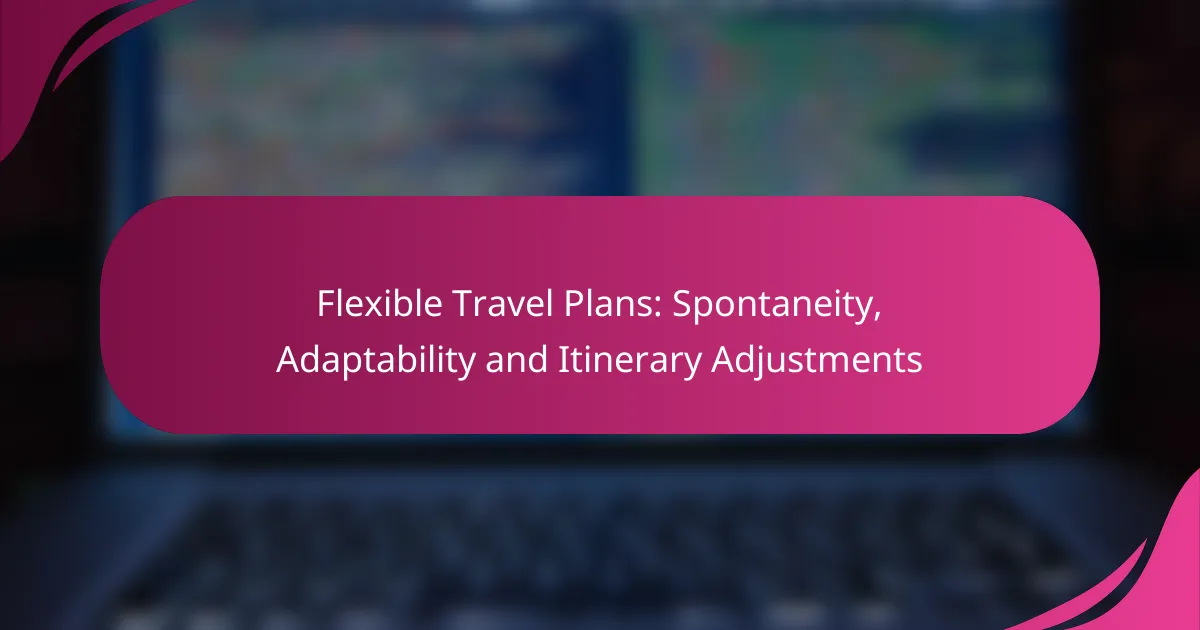Flexible travel plans enhance the travel experience by promoting spontaneity and adaptability, enabling travelers to make quick decisions and adjust their itineraries as needed. This approach not only fosters unexpected adventures but also caters to diverse preferences, ensuring that both solo adventurers and families can enjoy a tailored travel experience. By leveraging technology and maintaining a flexible mindset, travelers can effectively navigate changes and seize new opportunities during their journeys.

How can flexible travel plans enhance spontaneity in the USA?
Flexible travel plans significantly boost spontaneity by allowing travelers to make quick decisions and adapt their itineraries on the go. This adaptability opens up opportunities for unexpected adventures and experiences that structured plans might overlook.
Increased freedom for last-minute trips
Flexible travel arrangements enable last-minute trips without the stress of rigid schedules. Travelers can take advantage of sudden flight deals or local events, making it easier to explore new destinations on a whim.
For instance, if a traveler finds a great deal on a flight to a nearby city, they can book it immediately and adjust their plans accordingly. This freedom allows for a more relaxed travel experience, as there’s no need to stick to a pre-planned itinerary.
Opportunities for unique experiences
With flexible travel plans, travelers can seize unique opportunities that arise during their journey. This could include local festivals, spontaneous meetups with locals, or discovering hidden gems that aren’t on the typical tourist path.
For example, if a traveler hears about a food festival happening in their current city, they can easily change their plans to attend. Such experiences often lead to memorable adventures that enrich the overall travel experience.

What are the best strategies for adapting travel itineraries?
The best strategies for adapting travel itineraries include staying informed through technology, packing wisely, and maintaining a flexible mindset. These approaches allow travelers to respond effectively to unexpected changes and opportunities during their trips.
Utilizing mobile apps for real-time updates
Mobile apps are essential for receiving real-time updates on flight statuses, weather changes, and local events. Applications like FlightAware or TripIt can provide notifications about delays or gate changes, helping you adjust your plans quickly.
Consider using navigation apps such as Google Maps or Waze to find alternative routes or discover nearby attractions. These tools can enhance your travel experience by allowing you to explore spontaneously while avoiding potential disruptions.
Creating a flexible packing list
A flexible packing list is crucial for adapting to various travel scenarios. Focus on versatile clothing items that can be mixed and matched, and include essentials like a portable charger and travel-sized toiletries to accommodate last-minute changes.
Consider packing a lightweight rain jacket or an extra layer for unexpected weather. This approach ensures you’re prepared for different conditions without overpacking, allowing for easier adjustments to your itinerary.

How do flexible travel plans cater to different traveler types?
Flexible travel plans are designed to accommodate various traveler preferences and needs, allowing for spontaneity and adaptability. By offering options that can be adjusted on-the-fly, these plans appeal to solo adventurers, families, and others who may require different levels of structure during their trips.
Solo travelers seeking adventure
Solo travelers often thrive on spontaneity, making flexible travel plans ideal for them. These plans allow individuals to explore new destinations at their own pace, whether that means extending a stay in a captivating city or changing course to follow a new interest.
For example, a solo traveler might book a flight to a major city but leave accommodations open-ended, allowing them to choose where to stay based on recommendations from locals or fellow travelers. This approach can lead to unexpected adventures and deeper cultural experiences.
Families needing adaptable schedules
Families benefit from flexible travel plans that can accommodate the varying needs of children and adults alike. With children in tow, schedules can change rapidly, and having the option to adjust itineraries helps reduce stress and enhance enjoyment.
For instance, a family might plan a trip that includes a mix of structured activities, like museum visits, and free time for spontaneous exploration. This balance allows families to enjoy planned events while also taking advantage of unexpected opportunities, such as a local festival or a park outing.
To ensure adaptability, families should prioritize accommodations that offer flexible check-in and check-out policies, as well as consider travel insurance that covers changes in plans. This way, they can make the most of their travel experience without feeling constrained by rigid schedules.

What tools can assist in managing flexible travel plans?
Several tools can help manage flexible travel plans, allowing for spontaneity and adaptability. Utilizing technology such as mapping services and itinerary management apps can streamline adjustments and enhance the travel experience.
Google Maps for route adjustments
Google Maps is an essential tool for making real-time route adjustments during travel. It provides up-to-date traffic information, alternative routes, and estimated arrival times, which can be crucial when plans change unexpectedly.
When using Google Maps, consider enabling location services for accurate navigation. You can also save favorite locations and create lists of places to visit, making it easier to pivot your itinerary on the go.
Travel apps like TripIt for itinerary management
Travel apps like TripIt help organize and manage your itinerary in one place. By simply forwarding confirmation emails, the app automatically creates a detailed travel plan, which can be easily accessed and modified as needed.
Using TripIt can save time and reduce stress, especially when plans shift. Make sure to check for features like real-time flight alerts and shared itineraries with travel companions to enhance coordination.

How can travelers balance spontaneity with budget constraints?
Travelers can effectively balance spontaneity with budget constraints by being flexible with their travel dates and destinations. This approach allows for the discovery of affordable options while still embracing the thrill of last-minute adventures.
Finding last-minute deals on flights
Last-minute flight deals can offer significant savings, often ranging from 20% to 50% off regular prices. To find these deals, travelers should utilize flight comparison websites and set up alerts for price drops on their preferred routes.
Booking flights on weekdays, particularly Tuesdays and Wednesdays, can also yield better prices. Additionally, consider flying during off-peak hours or to less popular airports to maximize savings.
Utilizing budget accommodation options
Budget accommodation options include hostels, guesthouses, and short-term rentals, which can significantly reduce travel costs. Prices for these accommodations can vary widely, but travelers often find options for as low as $20 to $50 per night.
Using platforms like Airbnb or Booking.com allows for easy comparison of prices and amenities. Travelers should also consider staying with locals through home exchange programs or couchsurfing to enhance their experience while saving money.

What are the benefits of flexible travel plans for business trips?
Flexible travel plans for business trips offer significant advantages, including the ability to adapt to changing schedules and unexpected opportunities. This adaptability can lead to improved productivity and a more enjoyable travel experience.
Improved work-life balance
Flexible travel arrangements allow business travelers to better manage their personal and professional commitments. By adjusting travel dates or locations, individuals can allocate time for family or leisure activities, reducing stress and enhancing overall well-being.
For instance, if a meeting is rescheduled, travelers can take advantage of the extra time to explore the local area or engage in personal interests. This balance can lead to increased job satisfaction and motivation.
Opportunities for networking
Flexible travel plans create more opportunities for networking by allowing business travelers to attend events or meet with contacts that may not have been part of the original itinerary. This can lead to valuable connections and potential collaborations.
Consider scheduling additional meetings or attending industry conferences that align with your travel schedule. Engaging with peers in informal settings, such as local cafes or networking events, can foster relationships that benefit your career in the long run.

How can travelers prepare for unexpected changes?
Travelers can prepare for unexpected changes by maintaining flexibility in their plans and being ready to adapt to new circumstances. This involves having backup options and essential documents readily available to ensure a smooth transition when plans shift.
Researching alternative destinations
Before embarking on a trip, it’s wise to research alternative destinations that could serve as substitutes if your original plans fall through. Consider factors such as proximity, weather conditions, and local attractions to ensure a seamless transition.
For instance, if a flight to Paris is canceled, knowing about nearby cities like Brussels or Amsterdam can save time and stress. Keep a list of potential alternatives handy, along with their travel requirements and estimated costs.
Keeping essential documents accessible
Having essential travel documents easily accessible is crucial for managing unexpected changes. This includes your passport, travel insurance, and any necessary visas, which should be stored in a secure yet reachable location.
Consider using a travel wallet or a digital app to keep these documents organized. Ensure that you have both physical copies and digital backups stored in a secure cloud service, allowing you to retrieve them quickly if needed.

What emerging trends are shaping flexible travel in 2024?
In 2024, flexible travel is increasingly influenced by a growing demand for spontaneity and adaptability among travelers. Key trends include the rise of last-minute bookings, the use of technology for real-time itinerary adjustments, and a focus on personalized travel experiences.
Last-Minute Bookings
Last-minute bookings are becoming more popular as travelers seek spontaneity. Many platforms now offer significant discounts for accommodations and flights booked within days of departure, making it easier to plan trips on a whim.
Travelers can take advantage of apps that specialize in last-minute deals, often saving up to 50% compared to regular prices. This trend encourages a more adventurous approach, allowing for unplanned detours and experiences.
Real-Time Itinerary Adjustments
Technology plays a crucial role in enabling real-time itinerary adjustments. Mobile apps allow travelers to modify their plans instantly based on changing circumstances, such as weather conditions or personal preferences.
For instance, if a traveler finds a local festival or event, they can easily reschedule their activities to participate. This flexibility enhances the overall travel experience, making it more dynamic and engaging.
Personalized Travel Experiences
Personalization is key in flexible travel, with many companies offering tailored experiences based on individual preferences. This trend is driven by data analytics, which helps providers understand traveler behavior and desires.
Travelers can now choose from a variety of options that cater to their interests, whether it’s culinary tours, adventure activities, or wellness retreats. This customization fosters a deeper connection to destinations and enriches the travel journey.
